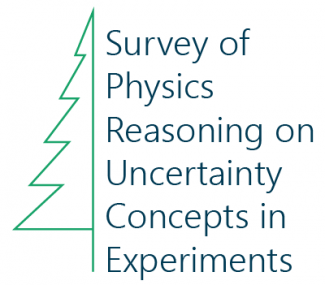SPRUCE for Instructors and Researchers
What is SPRUCE?
The Survey of Physics Reasoning on Uncertainty Concepts in Experiments (SPRUCE) is an assessment that is being developed to measure student performances around measurement uncertainty in lower-division lab courses.
The assessment is intended to be administered both pre-instruction and post-instruction in order to help measure student gains in the area of measurement uncertainty. It consists of four 'experiments' in which students answer numerous questions pertaining to sources of uncertainty, handling and propagation of uncertainty, and uncertainty that arises from distributions of measurements.
Design and Validation of SPRUCE
The research team has identified 14 Assessment Objectives that are targeted by the assessment (listed below). SPRUCE item development is complete and the research team is now working to validate the instrument.
Sources of Uncertainty
S1 Estimate size of random/statistical uncertainty by considering instrument precision
S2 Identify actions that might improve precision
S3 Identify actions that might improve accuracy
Handling of Uncertainty
H1 Propagate uncertainties using formulas
H2 Report results with uncertainties with correct significant figures
Distributions from Repeated Measurements
D1 Articulate why it is important to take several measurements during experimentation
D2 Articulate that repeated measurements will give a distribution of results and not a single number
D3 Calculate and report the mean of a distribution for the best estimate of the measurement
D4 Appropriately use and differentiate between standard deviation and standard error
D5 Determine if two measurements (with uncertainty) agree with each other
Administering SPRUCE
If you are interested in administering SPRUCE in your course, please follow this link or contact Heather Lewandowski - lewandoh@colorado.edu.



 The Physics Frontiers Centers (PFC) program supports university-based centers and institutes where the collective efforts of a larger group of individuals can enable transformational advances in the most promising research areas. The program is designed to foster major breakthroughs at the intellectual frontiers of physics by providing needed resources such as combinations of talents, skills, disciplines, and/or specialized infrastructure, not usually available to individual investigators or small groups, in an environment in which the collective efforts of the larger group can be shown to be seminal to promoting significant progress in the science and the education of students. PFCs also include creative, substantive activities aimed at enhancing education, broadening participation of traditionally underrepresented groups, and outreach to the scientific community and general public.
The Physics Frontiers Centers (PFC) program supports university-based centers and institutes where the collective efforts of a larger group of individuals can enable transformational advances in the most promising research areas. The program is designed to foster major breakthroughs at the intellectual frontiers of physics by providing needed resources such as combinations of talents, skills, disciplines, and/or specialized infrastructure, not usually available to individual investigators or small groups, in an environment in which the collective efforts of the larger group can be shown to be seminal to promoting significant progress in the science and the education of students. PFCs also include creative, substantive activities aimed at enhancing education, broadening participation of traditionally underrepresented groups, and outreach to the scientific community and general public.